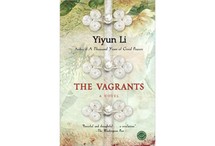The Vagrants
By Yiyun Li
352 pages;
Random House
It is the vernal equinox, 1979, and in the small provincial city of Muddy River, China, a 28-year-old woman, Gu Shan, is scheduled to be executed for counterrevolutionary activities. In Beijing the Democracy Wall movement—the seed that will, 10 years later, blossom into Tiananmen Square—has begun, but in the provinces the children are still taught to revere the "honeypot" of an unimpeachable Communism. On a street corner, Gu Shan's grieving mother burns clothes in hopes of sending them with her daughter to the other side, while her father, Teacher Gu, redoubles his efforts at stoicism, wonders "what is revolution except a systematic way for one species to eat another alive." Elsewhere in Muddy River, young Tong tries to educate his dog, Ear, to the dangers of urban life; sociopathic Bashi hunts for an abandoned baby girl along the riverbanks so he can see what a woman looks like "down there"; lovely Kai, among the most privileged wives in town, longs for her tubercular, dissident lover; and crippled, insatiable Nini steals and eats the flour paste used to post the announcements of Gu Shan's execution. These are only some of the movements and motifs that run through Yiyun Li's illuminating, morally complex, and symphonic novel, The Vagrants. Each of Li's stunningly realized characters struggles to hold on to hope in a system so oppressive that sacrificing one's dignity is the only path to survival, and so corrupt that "the one who robs and succeeds will become the king, and the one who tries to rob and fails will be called a criminal."
— Pam Houston


